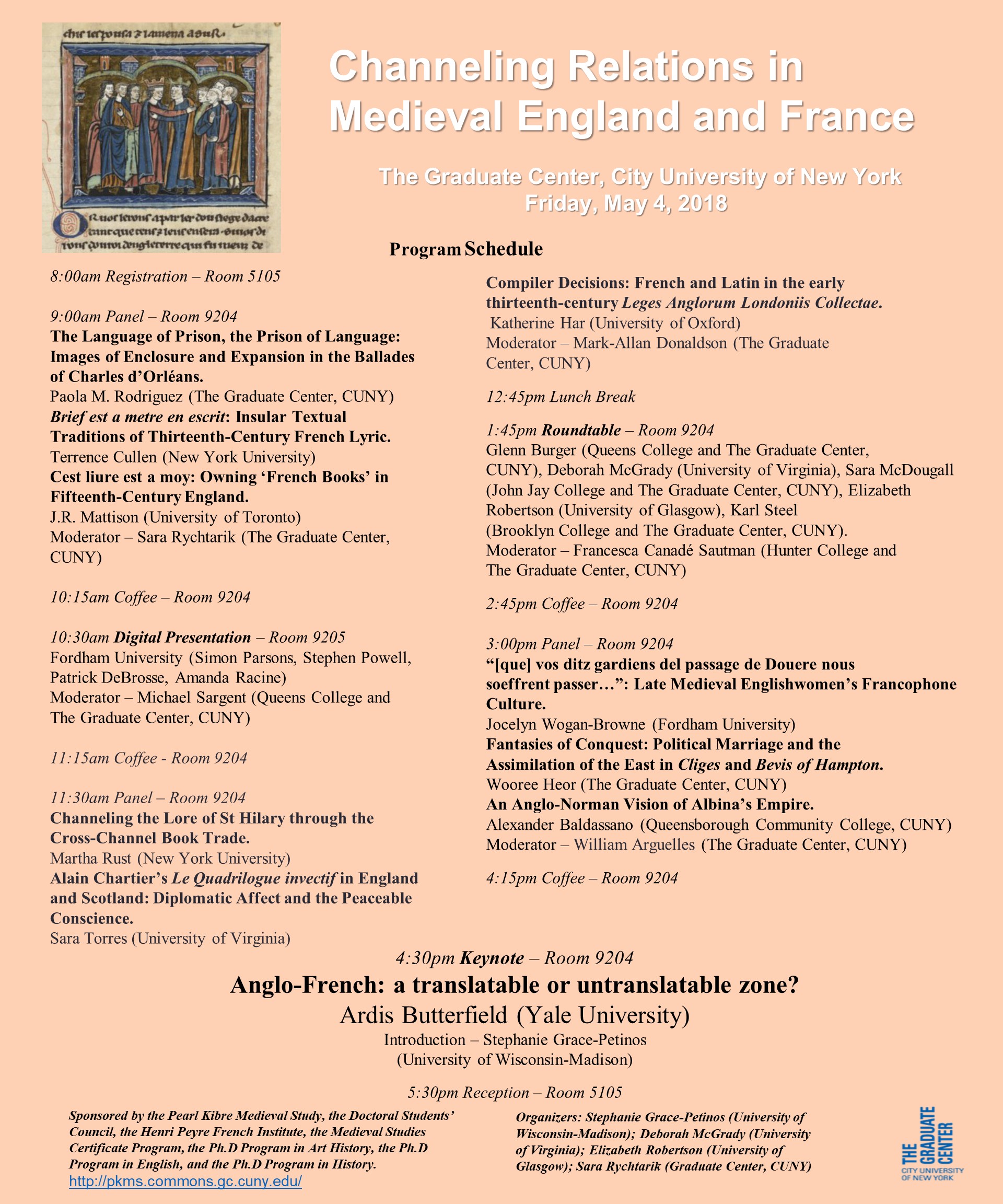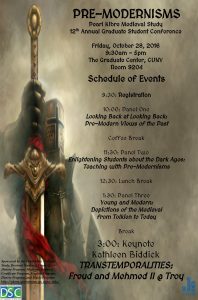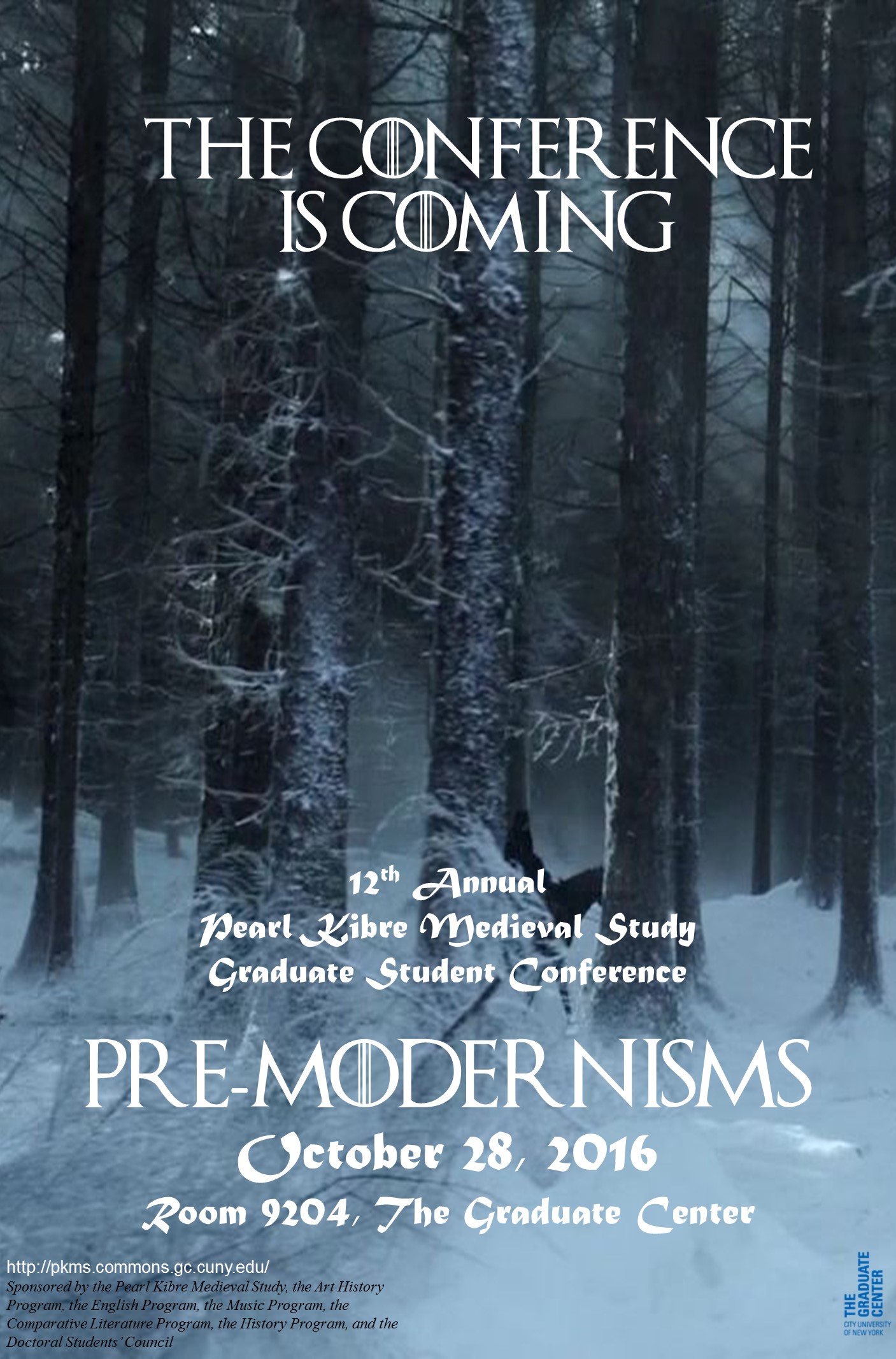Home » Conference
Category Archives: Conference
PKMS 2020 Conference CFP: Working Through and Beyond the “Global Turn” in Medieval Studies
The 15th Pearl Kibre Medieval Study annual conference will consider the field of medieval studies beyond Eurocentrism and other tacit cultural, geographical, and temporal assumptions on the study of the Middle Ages, inviting scholars to engage in the “global turn” in medieval studies. The field of medieval studies suffers internally and externally from an image of narrowed focus; the perception that the field preoccupies itself solely on one culture, language, race, or religion. In recent decades, medieval scholars have sought to work against this perception and move beyond geographic, national, disciplinary, linguistic boundaries; pulling from multiple sources across a wide variety of languages, literatures, artifacts, and cultures to enrich their academic interrogations. Along with striving to include more diverse primary material, the field has also seen an increase in the variety of theoretical apparatus applied to the Middle Ages, such as critical race theory and post-colonial studies. The result of these efforts is the reshaping of ideas concerning the Middle Ages, no longer as a secluded and homogeneous time between Antiquity and the Renaissance, but a period of global cultural production in conversation with its predecessors and successors.
The 2020 PKMS conference will embrace this “global turn” in medieval studies, expanding upon the ongoing conversations concerning the insular perception of the Middle Ages and the constant struggles to escape the geopolitical and disciplinary confines of our field. We invite papers that take ‘global’ approaches to the studies in the Middle Ages, geographically, methodologically, and/or pedagogically. We also particularly welcome papers that reassess the geographical and temporal confines of medieval studies as a discipline. We invite proposals for intersectional and/or interdisciplinary papers in medieval studies from all disciplines, regions, languages, methodologies, theoretical approaches, etc. We also welcome proposals for papers on the practical aspects, challenges, and benefits of interdisciplinary and intersectional work in medieval studies.
Submit 250-word abstracts to [email protected] by January 31, 2020.
Potential topics include, but not limited to:
Geography, Nations and Borders in and about the “Global Middle Ages”
- Studies in early globalization
- Merits (and vice versa) of studies in the Global Middle Ages
- Decentering Europe in the study of the Middle Ages
- Disrupting the notion of Translatio Imperii
- The exclusion of figures within limited national boundaries
- The relationship (power dynamic) between the Western and Eastern Middle Ages.
- The exclusion of the African Middle Ages in mainstream medievalism
Historicity and Historical Narratives in and about the “Global Middle Ages”
- Global inheritance of medieval thought
- Re-classifying temporal categorization (the Middle Ages, but in the middle of what and where?)
- Diversity (cultural, religious, literary, political, economic) in the Middle Ages stemming from global relationships
Literature and Language in and about the “Global Middle Ages”
- Polylingualism
- Comparative analysis on a global scale
- Perspectives on the ‘global literature’
- The claiming of bodies/characters for national use
- Culture erasure/editing in medieval literature and contemporary criticism
Pedagogy of the “Global Middle Ages”
- Teaching a “global” Middle Ages
- The defense or denial of euro-/white-centrist works/organizations
- Theorizing the idea of “global” in medieval studies
- The “Global Middle Ages” as an interdisciplinary approach to medieval studies
- What does the “global” Middle Ages (or medieval studies) mean for euro-medievalists, or for Early English medievalists?
- New theoretical approaches to established texts
Crossing Boundaries: Program
Conference Schedule
Friday, May 3, 2019
The CUNY Graduate Center
365 5th Avenue
New York, NY 10016
Room 5409
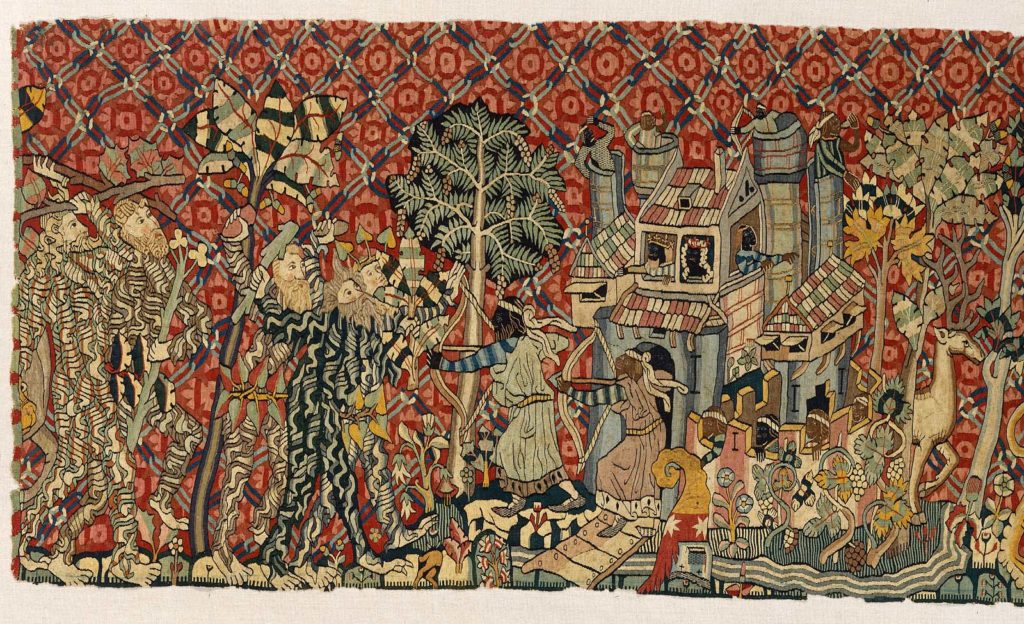
8:30am-9:00am Registration & Breakfast
9:00am-10:15am Panel #1: Crossing TEMPORAL Boundaries
Moderator: Dainy Bernstein
Fate, Faust, and Magical Girls: Japanese Reception of German Medievalism through the Case of Puelli Magi Madoka Magicka
William Arguelles, GC
Crossing the Irish Border: Towards an Understanding of Ireland’s Early Medieval Sculptural Heritage
Megan Henvey, University of York
10:15am-10:25am Coffee Break
10:25am-11:40am Panel #2: Crossing AESTHETIC Boundaries
Moderator: Robin Hizme
“Luminous and Gracefully Decorated”: A Guided Reading of the Armenian Lives of the Fathers
Earnestine Qiu, Tufts University
Le Roman de la Rose and the Dialectic of Vices: Text and Image
Cortney Berg, Arizona State University
“In swich Englissh as he kan”: A Study of Chaucer’s Vernacular
Wesley Boyko, Vanderbilt University
11:40am-11:50am Coffee Break
11:50am-1:05pm Panel #3: Crossing NORMATIVE Boundaries
Moderator: Jennifer Alberghini
The Precarious Language of Madness in Thomas Hoccleve’s Complaint
Emily Price, GC
The Well Behaved Rarely Make History: A Case Study of Cross-Dressing in Regard to Sodomy Laws and Gender Constructions in the High and Late Middle Ages
Margaret Paz, San Francisco State University
“How Can I Know if This is Truly a Sickness, or Something Else?”: Medieval Epistemology of Humoral Imbalance of the Love-Sick Body in Cligès
Miranda Hajduk, GC
1:05pm-2:10pm Lunch Break
2:10pm-3:10pm Roundtable: Teaching Across Boundaries in Medieval Classes
Moderator: Steven Kruger, Queens College and GC
Kristina Richardson (History, Queens College), Jennifer Ball (Art History, Brooklyn College and GC), Abby Kornfeld (Art History and Jewish Studies, City College of New York), Lauren Mancia (History, Brooklyn College)
3:10pm-3:20pm Coffee Break
3:20pm-4:35pm Panel #4: Crossing CULTURAL Boundaries
Moderator: William Arguelles
Tristan and the Medieval World
Mark-Allan Donaldson, GC
Majority in Number, Minority in Status, the Legacy of Byzantium in Islamic State Administration
Aliya Abdukadir Ali, Exeter University
Gender, Disability, and Jews in the Old English “Elene”: Intersections
Heide Estes, Monmouth University
4:35-4:45pm Coffee Break
4:45pm-5:45pm Keynote
Moderator: Soojung Choe
Of Saracens and Their Objects in the Epic: Translation, Association, Desire
Shirin Khanmohamadi, San Francisco State University
5:45pm Reception
PKMS 2019 Conference CFP: Crossing Boundaries
Crossing Boundaries: Towards an Interdisciplinary Medieval Studies
Date: May 3, 2019
Location: The Graduate Center, CUNY
Keynote Speaker: Shirin Khanmohamadi, San Francisco State University
The Pearl Kibre Medieval Study’s 14th annual conference in May will showcase a variety of scholarship with interdisciplinary or intersectional approaches. It will also consider the field of medieval studies in light of recent conversations such as those about Eurocentrism, racism, sexism, homophobia, and transphobia at Leeds and Kalamazoo. It will specifically seek to open spaces for graduate students and other potentially vulnerable members of academia to engage with the recent debates and other complicated and controversial topics.
The 2018 PKMS conference explored the relationship between French and English departments, literatures, and cultures. The 2017-2018 workshop series focused on decentralizing Europe in medieval studies in our research and teaching. Medieval scholars often work across disciplines, but the institutional lack of communication across disciplinary borders has become more apparent recently, and the need to collapse those borders more urgent. The 2019 PKMS conference will expand those conversations beyond England and France, bringing together medieval scholars who work in various disciplines and with various methodologies for this day-long conversation, as the culmination of a year of graduate-student workshops on interdisciplinarity and intersectionality in medieval studies.
We invite proposals for intersectional and/or interdisciplinary papers in medieval studies from all disciplines, regions, languages, methodologies, theoretical approaches, etc. We also welcome proposals for papers on the practical aspects, challenges, and benefits of interdisciplinary and intersectional work in medieval studies. Submit 250-word abstracts to [email protected] by December 31, 2018 JANUARY 31, 2019.
Topics may include, but are not limited to:
- Spatial, temporal, and disciplinary boundaries in medieval studies
- The history of medieval studies
- The “Global Middle Ages”
- Global views of the European Middle Ages
- Working with multiple languages
- Working with translations and editions
- Medieval translations and adaptations of texts
- Studies in comparative religion
- The politics of medievalism
- Legal status of women in various regions, religions, etc.
- Representations of women across multiple contexts
- Medieval studies and a method of colonization
- Similar traditions in Western and non-Western contexts
- Digital Humanities in medieval studies
- Medievalists and medicine / medieval medicine
- Dis/ability in the Middle Ages
- Medievalists teaching non-medieval topics and texts
- Later uses of medieval music, art, and motifs
- Medieval ideologies and constructions of identity surrounding gender, sexuality, race, ethnicity, religion, and social class
PKMS Conference: Channeling Relations in Medieval England and France
Program Schedule:
8:00am Registration – Room 5105
9:00am Panel – Room 9205
NOTE ROOM CHANGE – 9204
The Language of Prison, the Prison of Language: Images of Enclosure and Expansion in the Ballades of Charles d’Orleans
Paola M. Rodriguez (The Graduate Center, CUNY)
Brief est a metre en escrit: Insular Textual Traditions of Thirteenth-Century French Lyric
Terrence Cullen (New York University)
Cest liure est a moy: Owning ‘French Books’ in Fifteenth-Century England
J.R. Mattison (University of Toronto)
Moderator: Sara Rychtarik (The Graduate Center, CUNY)
10:15am Coffe – Room 9205
10:30am Digital Presentation – Room 9205
Fordham University (Simon Parsons, Stephen Powell, Patrick DeBrosse, Amanda Racine)
Moderator: Michael Sargent (Queens College and The Graduate Center, CUNY)
11:15am Coffee – Room 9205
11:30am Panel – Room 9205
Channeling the Lore of St Hilary through the Cross-Channel Book Trade
Martha Rust (New York University)
Alain Chartier’s Le Quadrilogue invectif in England and Scotland: Diplomatic Affect and the Peaceable Conscience.
Sara Torres (University of Virginia)
Compiler Decisions: French and Latin in the early thirteenth-century Leges Anglorum Londiniis Collectae
Katherine Har (University of Oxford)
Moderator: Mark-Allan Donaldson (The Graduate Center, CUNY)
12:45pm Lunch Break
1:45pm Roundtable – Room 9205
Glenn Burger (Queens College and The Graduate Center, CUNY)
Deborah McGrady (University of Virginia)
Sara McDougall (John Jay College and The Graduate Center, CUNY)
Elizabeth Robertson (University of Glasgow)
Karl Steel (Brooklyn College and The Graduate Center, CUNY)
Moderator: Francesca Canade Sautman (Hunter College and The Graduate Center, CUNY)
2:45pm Coffee – Room 9205
3:00pm Panel – Room 9205
“[que] vos ditz gardiens del passage de Douere nous soeffrent passer…”: Late Medieval Englishwomen’s Francophone Culture.
Jocelyn Wogan-Browne (Fordham University)
Fantasies of Conquest: Political Marriage and the Assimilation of the East in Cliges and Bevis of Hampton
Wooree Heor (The Graduate Center, CUNY)
An Anglo-Norman Vision of Albina’s Empire
Alexander Baldassano (Queensborough Community College, CUNY)
Moderator: William Arguelles (The Graduate Center, CUNY)
4:15pm Coffee – Room 9205
4:30pm Keynote – Room 9205
Anglo-French: a translatable or untranslatable zone?
Ardis Butterfield (Yale University)
Introduction – Stephanie Grace-Petinos (University of Wisconsin-Madison)
5:30pm Reception – Room 5105
Organizers: Stephanie Grace-Petinos (University of Wisconsin-Madison); Deborah McGrady (University of Virginia); Elizabeth Roberston (University of Glasgow); Sara Rychtarik (Graduate Center, CUNY)
Sponsored by the Pearl Kibre Medieval Study, the Doctoral Students’ Council, the Henri Peyre French Institute, the Medieval Studies Certificate Program, the Ph.D. Program in Art History, the Ph.D. Program in English, and the Ph.D. Program in History
UPDATED CFP: Channeling Relations in Medieval England and France
Channeling Relations in Medieval England and France
Organizers: Stephanie Grace-Petinos (University of Wisconsin-Madison); Deborah McGrady (University of Virginia); Elizabeth Robertson (University of Glasgow); Sara Rychtarik (Graduate Center, CUNY)
Date: May 4, 2018
Location: CUNY Graduate Center
Keynote Speaker: Ardis Butterfield
For medievalists, interdisciplinary work has always been a necessity, and our major annual conferences reflect this need to broaden our understanding of the dynamic and widespread time period. While medieval scholars may specialize in one area of medieval studies, they also understand that separating traditions – by culture, language, religion, geographic borders, etc. – can create a limited and narrow understanding of the Middle Ages. This is especially the case for medievalists who study medieval England and France. Although, or perhaps because, they were frequently engaged in war, these two countries had many rich literary and cultural exchanges over the course of the Middle Ages. For Middle English scholars, French literature and music are often valuable resources for the sources of the works of popular authors such as Geoffrey Chaucer, and so are often read in medieval English classes. Yet why is Chaucer not routinely read in French departments? Or, on the other side, medieval English texts, law, as well as literature, were often written in French, not English. But British literature survey courses often limit their coverage of the Anglo-French corpus to one or two lais of Marie de France.
This one-day conference offers the opportunity for scholars, whether they usually preserve or cross departmental lines in their own work, to come together with scholars from departments with whom they may not routinely discuss academic work/research/approaches. While this conference focuses on literary and cultural exchanges between England and France, we are not discounting other traditions and welcome submissions for individual papers or full panel proposals that also incorporate other perspectives, particularly non-western.
Topics to be discussed can include, but are by no means limited to:
- A text that belongs to both the English and French traditions
- A text, legend or corpus of characters that exist with variations in each tradition
- A textual theme shared by both traditions
- A historical event that occurred in both traditions (i.e. The Hundred Years War)
- Religious orders or religious figures prominent in both England and France
- Historical or literary figures that travel throughout England and France
- French texts that circulate within England; English texts that circulate within France; English and/or French texts that circulate within both England and France
This event is hosted by Pearl Kibre Medieval Study at the CUNY Graduate Center, with contributions by the Medieval Studies Certificate Program.
Please send abstracts of 250 words to [email protected] by January 31, 2018.
CFP 2018 Conference Channeling Relations in Medieval England and France
Organizers: Stephanie Grace-Petinos (University of Wisconsin-Madison); Deborah McGrady (University of Virginia); Elizabeth Robertson (University of Glasgow); Sara Rychtarik (Graduate Center, CUNY)
Date: May 4, 2018
Location: CUNY Graduate Center
This event is hosted by Pearl Kibre Medieval Study at the CUNY Graduate Center
For medievalists, interdisciplinary work has always been a necessity, and our major annual conferences reflect this need to broaden our understanding of the dynamic and widespread time period. While medieval scholars may specialize in one area of medieval studies, they also understand that separating traditions – by culture, language, religion, geographic borders, etc. – can create a limited and narrow understanding of the Middle Ages. This is especially the case for medievalists who study medieval England and France. Although, or perhaps because, they were frequently engaged in war, these two countries had many rich literary and cultural exchanges over the course of the Middle Ages. For Middle English scholars, French literature and music are often valuable resources for the sources of the works of popular authors such as Geoffrey Chaucer, and so are often read in medieval English classes. Yet why is Chaucer not routinely read in French departments? Or, on the other side, medieval English texts, law, as well as literature, were often written in French, not English. But British literature survey courses often limit their coverage of the Anglo-French corpus to one or two lais of Marie de France.
This one-day conference offers the opportunity for scholars, whether they usually preserve or cross departmental lines in their own work, to come together with scholars from departments with whom they may not routinely discuss academic work/research/approaches. While this conference focuses on literary and cultural exchanges between England and France, we are not discounting other traditions and welcome submissions for individual papers or full panel proposals that also incorporate other perspectives, particularly non-western.
Topics to be discussed can include, but are by no means limited to:
– A text that belongs to both the English and French traditions
– A text, legend or corpus of characters that exist with variations in each tradition
– A textual theme shared by both traditions
– A historical event that occurred in both traditions (i.e. The Hundred Years War)
– Religious orders or religious figures prominent in both England and France
– Historical or literary figures that travel throughout England and France
– French texts that circulate within England; English texts that circulate within France; English and/or French texts that circulate within both England and France
Please send abstracts of 250 words to [email protected] by December 31, 2017.
Conference Full Schedule with Participants
9:30: Registration
10:00: Panel One | Looking Back at Looking Back: Pre-Modern Views of the Past
Moderator: Alexander Baldassano, CUNY Graduate Center
Classicisms and Medievalisms in the Songs of Raimbaut de Vaqueiras
Clare Wilson, CUNY Graduate Center
Poking Holes in the Walls of the Patriarchy: The Pyramus and Thisbe Myth in Chaucer and Shakespeare
Jennifer Alberghini, CUNY Graduate Center
For Your Reference (and Reverence): Illustrated Relic Directories and German Media Theory for the Late Middle Ages
Christian Whitworth, Tufts University
Coffee Break
11:30: Panel Two | Enlightening Students about the Dark Ages: Teaching with Pre-Modernisms
Moderator: Allen Strouse, CUNY Graduate Center
Shame! Shame! Shame! Teaching Puritanism with The Game of Thrones
Christina Katopodis, CUNY Graduate Center
Introducing Witch Diction: An Investigation and Analysis of the Pedagogical Presentation of Witchcraft in the Undergraduate Historical Seminar Setting
Ryan Kelly, Eastern University
12:30: Lunch Break
1:30: Panel Three | Young and Modern: Depictions of the Medieval from Tolkien to Today
Moderator: Mary Jean McNamara, CUNY Graduate Center
Fighting the Past: Medieval Dragons in Children’s and YA Literature
Esther Bernstein, CUNY Graduate Center
Tolkien’s Unstable Machinery: The Lord of the Rings as Mimetic History
Micheal Angelo Rumore, CUNY Graduate Center
Compression Dangerous and Beautiful: Incest as Intimate Politics in Elizabeth E. Wein’s The Winter Prince
Rebecca Fullan, CUNY Graduate Center
Break
3:00: Keynote | TRANSTEMPORALITIES: Freud and Mehmed II @ Troy
Kathleen Biddick, Temple University
12th Annual PKMS Graduate Student Conference-Pre-Modernisms Preliminary Schedule
PRE-MODERNISMS
Pearl Kibre Medieval Study
12th Annual Graduate Student Conference
Friday, October 28, 2016
9:30am – 5pm
The Graduate Center, CUNY
Room 9204
Schedule of Events
9:30: Registration
10:00: Panel One
Looking Back at Looking Back:
Pre-Modern Views of the Past
Coffee Break
11:30: Panel Two
Enlightening Students about the Dark Ages:
Teaching with Pre-Modernisms
12:30: Lunch Break
1:30: Panel Three
Young and Modern:
Depictions of the Medieval
from Tolkien to Today
Break
3:00: Keynote
Kathleen Biddick
TRANSTEMPORALITIES:
Freud and Mehmed II @ Troy
12th Annual PKMS Graduate Student Conference CFP
Pre-Modernisms: Friday, October 28th, The Graduate Center, CUNY
As the famous sayings go, everything old is new again, and history repeats itself. How many times have we heard someone described as a Renaissance man or woman, or something that seems old-fashioned called “medieval?” Scholars of these periods often find, of course, that such evaluations are, at best, inaccurate. However, trans-temporal approaches to study and even historical anachronisms can produce fruitful new inquiries into our fields, from contemporary children’s literature that engages in medievalisms to produce new fantasy worlds to queer and transgender studies that attempt to see the past from non-normative perspectives. This conference aims to bring together a wide variety of scholars of different disciplines and especially different time periods to pair what we know about the classical, medieval, and early modern periods with what later times perceive about these periods and how they manipulate the past for present agendas. As such, this conference is aimed not only at pre-modern scholars, but also at scholars of later and contemporary periods whose work engages in envisioning the past.
Please submit a 300-word abstract no later than September 15 at 5 PM.
E-mail: [email protected]
Topics may include, but are not limited to:
Arthurian Tradition
Early Book Collections
Architectural Styles
Medieval TV and Film
Children’s and Young Adult Literature
Historical Fiction
J.R.R. Tolkien
Historically Based Political Rhetoric
History of Marginal Perspectives
Law and the Legal Tradition
Renaissance Humanism
Philosophical Traditions
Renaissance Faires and Period Dress
Medieval and Early Modern Adaptations of Classical Texts
Premodern Recipes and Remedies
Contemporary Classroom Approaches
Linguistic Developments
Premodern Historiography (including history plays)
Conference Livestreaming
To view a livestream of the conference, visit http://videostreaming.gc.cuny.edu/videos/
and click on the Medieval Graduate Student Conference.
“Sanctity and Sinfulness: Hagiographical Studies in Memory of Thomas Head” – 2016 Conference Schedule
We are pleased to announce the schedule for the Pearl Kibre Medieval Study’s upcoming annual graduate student conference, “Sanctity and Sinfulness: Hagiographical Studies in Memory of Thomas Head.” The conference will be held on Friday, February 26 from 10:30 a.m. to 4:00 p.m. in Room 9204 of the CUNY Graduate Center.
10:30 Registration
11:00 Panel 1: Embodiment and Evidence in the Lives of Holy Women
- Alexander Baldassano, CUNY Graduate Center – The Life of Saint Eugenia: Beyond Gender in the Legenda Aurea
- Alicia Cannizzo, CUNY Graduate Center – The Case of Margherita of Città di Castello and the Burden of Proof for Sainthood in the Later Middle Ages
12:00 Lunch Break
1:00 Roundtable: Hagiography and the Work of Thomas Head: The Legends and the Legacy
- Marlene Hennessy, CUNY Hunter
- Paul Freedman, Yale University
- Cynthia Hahn, CUNY Graduate Center & Hunter
2:30 Exploring the Kinship of the Sacred and the Secular
- Stephanie Petinos, CUNY Graduate Center – Relicized bodies in Le Roman de la Manekine
- Alyssa Coltrain, Rutgers University – “Now art thus Goddus child”: Appropriating Hagiography and Rewriting Family in Sir Gowther
- David A. Heayn, CUNY Graduate Center – Byzantine Monasticism in Two Anatolian Provinces, ca. 500-700
4:15 Reception, room 5105
Call for Papers for 11th Annual PKMS Graduate Student Conference
“Sanctity and Sinfulness: Hagiographical Studies in Memory of Tom Head”
11th Annual Pearl Kibre Medieval Study Graduate Student Conference
The Pearl Kibre Medieval Study, the CUNY Graduate Center’s student-run organization for medieval studies, announces its eleventh annual Graduate Student Conference at the CUNY Graduate Center on Friday, February 26, 2016. This year’s conference is dedicated to the work and legacy of Thomas Head. We invite grad students to submit proposals.
The conference will look at how saints and their cults and relics were used to support and/or oppose political ambitions; examine how members of the ecclesiastical and secular hierarchies attempted to balance a desire for God’s peace with the realities of lordship; and explore the patronage of saints, ideals of sanctity, and issues of episcopal influence and its effect on local saints.
Submit a 300-word abstract by December 14th to [email protected]
Topics may include, but are not limited to, the following:
-
Hagiography and hagiographers
-
Cults of saints
-
Ideals of sanctity
-
Peace and Truce of God
-
Secular appropriation of saints
-
Canonization and its process
-
Patronage of saints
-
Frankish lordship
-
Relics
-
Episcopal influence on local saints
We encourage papers to engage Tom’s scholarly legacy.
“Persecution, Punishment and Purgatory in the Long Middle Ages” – Grad Student Conference, Nov. 7, 2014
10th Annual Graduate Student Conference in Medieval Studies
Persecution, Punishment and Purgatory in the Long Middle Ages
November 7, 2014
Graduate Center – CUNY
Room 9205
9:30 — Registration
10:00 — Panel one
Esther Bernstein “Enmity and Amity: The Ambivalent Nature of Medieval Jewish-Christian Religious Borrowings”
David Heayn “Urban Violence: Riot Culture and Dynamics in Late Antique Eastern Mediterranean Cities”
Nicolas Bergamo “The Constantine V persecution: ‘Building a new imperial elite'”
Moderator: Clare Wilson
11:30 — Panel two
Sian Webb “Untitled”
Rachel Wagner “Acting Like Jesus: St. Margaret of Ypres’s Holy Performance”
Moderator: Jennifer Alberghini
12:30 — Lunch break
1:30 — Roundtable
Jay Gates
Christopher Leydon
Lauren Mancia
Haruko Momma
Moderator: David Greetham
3:30 — Panel three
Deidre Riley “Purgatories of the Mind: Punishment and Self-Knowledge in Robert of Cisyle”
Rebecca Fullan “Untitled”
Kristen Streahle “E bem cavalca a guiza de barone: Elena the Executioner”
Moderator: Chad Turner
This event is co-sponsored by the Pearl Kibre Medieval Study, the Doctoral Students’ Council, the Medieval Studies Certificate Program, the Henri Peyre French Institute, the French Department, the English Department, the Comparative Literature Department, and the Music Department.
Call for Papers: “Persecution, Punishment and Purgatory in the Long Middle Ages”
10th Annual Pearl Kibre Medieval Study Graduate Student Conference
CUNY Graduate Center, New York, NY
November 7, 2014
Persecution, Punishment and Purgatory in the Long Middle Ages
The Pearl Kibre Medieval Study, the CUNY Graduate Center’s student-run organization for medieval studies, announces its tenth annual Graduate Student Conference at the CUNY Graduate Center on Friday, November 7, 2014. This year’s theme, Persecution, Punishment and Purgatory, is designed to address a number of methodological, historical, and theoretical issues within the diverse fields of medieval studies ranging from late antiquity to the early modern period. We invite grad students to submit proposals.
Submit a 300-word abstract by September 5th to [email protected]
Topics may include, but are not limited to, the following:
- Origins and uses of persecution
- The result of religious and ethnic pogroms
- Forced conversions and expulsions
- Persecution as a method of socio-cultural nation and identity formation
- The character of legal and extra-legal punishment,
- Punishment as a form of discipline
- Self-inflicted punishment
- The role of punishment in the family
- The variations of punishment based on class, status, and gender
- Punishment as social control
- Concepts of the afterlife
- The relationship between sin/punishment and the afterlife
- Liminal spaces
- Peripheries
Medieval Celebrations — Ninth Annual PKMS Interdisciplinary Student Conference
Friday, February 28: 10:30 a.m. to 4:00 p.m.
CUNY Graduate Center, room 9207
10:30 Registration
11:00 Panel 1:
“The Uses of Rhetoric, Ritual and Wood in Chaucer’s Knight’s Tale” Jason Hoelzel (Brooklyn College)
“Medieval Festivals” Margaret Stella (University of Virginia)
12:00 Lunch Break
1:00 Roundtable: Medieval Celebrations
Richard Gyug (Fordham University, History)
Francesca Sautman (Graduate Center & Hunter College, French)
Maureen Tilley (Fordham University, Theology)
2:30 Panel 2:
“Aelred of Rievaulx and the Legitimizing Role of the Sacraments” Chad Turner (Graduate Center-CUNY)
“The Via Sacra as venue of negotiated power in Rome” Chris Petitt (Graduate Center-CUNY)
3:30 Reception
The Ninth Annual Pearl Kibre Medieval Study Interdisciplinary Student Conference
with the generous support of the Doctoral Students Council, Henri Peyre French Institute, Medieval Studies Certificate Program, and History, English, Music, Art History, Philosophy, and Theatre departments.
Call for Papers: Medieval Celebrations
9th Annual Pearl Kibre Medieval Study Graduate Student Conference
CUNY Graduate Center, New York, NY
February 28, 2014
“Medieval Celebrations”
The Pearl Kibre Medieval Study, CUNY Graduate Center’s student-run organization for medieval studies, is hosting their ninth annual graduate student conference: Medieval Celebrations. We invite grad students to submit proposals about celebrations of all kinds.
Topics for presentations include but are not limited to:
· Festivals, feasts, and food
· Holy days and saints days
· Forms of ritual
· The Mass
· Coronation
· Baptisms, weddings, and funerals
· Entertainment and performance
· Agriculture and pagan vestiges
· Markets
· Mockery and foolery
We also invite grad student performers of medieval music or dramatic arts to submit proposals for short performances (up to 30 minutes; please include estimation of time).
Please submit your abstract of no more than 300 words by Nov. 30 Dec. 13, 2013.
Include your name and affiliation.
Papers must be 15-20 minutes in length, and performances no more than 30 minutes.
Submissions should be emailed to [email protected]
8th Annual PKMS Conference: “New Media and the Middle Ages”
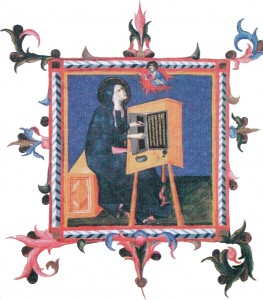 Friday, March 1
Friday, March 1
10:00 a.m. to 4:00 p.m.
Room 9205
Graduate Center, CUNY
365 Fifth Avenue, New York, 10016
8th Annual PKMS Conference
“New Media and the Middle Ages”
10:00 Registration
10:30 Panel 1: Sacred Technologies: Media and Memory
Moderator: Debra Hilborn, Graduate Center, CUNY
“Office Prayer as Technology-use”
Paul Holchak, English Program, Graduate Center, CUNY
Abstract
“A Multimedia Devotional Panel and the Journey from the Material to the Immaterial”
Sarah Dillon, Assistant Professor, Kingsborough Community College
Abstract
11:45 Panel 2: Digital Exploration: Mapping and Data Mining”
Moderator: David Heayn, Graduate Center, CUNY
“Exploratory Analysis of Arabic Biographical Collections: the case of al-Dhahabi’s (d. 1347 CE) ‘History of Islam'”
Maxim Romanov, PhD Candidate in Arabic and Islamic Studies, University of Michigan
50 Seconds of Islamic History
Abstract
“The Anglo-Saxon Chronicle Map: Google Earth and 1,000-year-old Texts”
Rebecca Shores, University of North Carolina
Abstract
12:45 Lunch Break
1:45 Keynote: “Virtual Mappa, or History Lessons in New Media”
Martin Foys, Associate Professor of English, Drew University; Co-director of the Digital Mappaemundi Project
3:00 Panel 3: Digital Humanities at Work: Current Projects
Moderator: Chase Robinson, Provost, Graduate Center, CUNY
“Mapping a Medieval Career: Jean Gerson, Joan of Arc and the Power of Data Visualization”
Miriam Ward, SUNY New Paltz
Abstract
“Documenting Cappadocia: Building a Community through Digital Scholarship”
Alice Lynn McMichael, Art History, Graduate Center, CUNY
Documenting Cappadocia
4:00 Reception
The Eighth Annual Pearl Kibre Medieval Study Interdisciplinary Student Conference
with the generous support of the Graduate Center Digital Initiatives, Medieval Studies Certificate Program, Doctoral Students Council, and Art History, History, English, Music, and Theatre departments.
